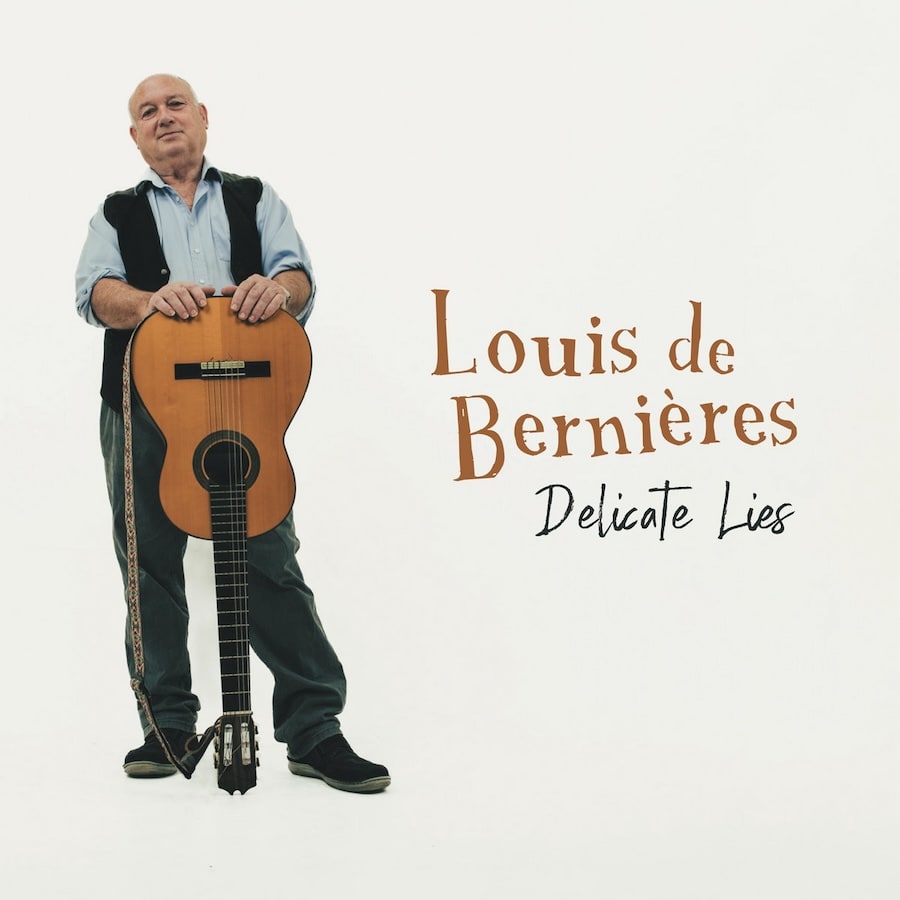
Probably best known as the author of Captain Corelli’s Mandolin and his many novels, Louis de Bernières is also a published poet and singer-songwriter. Indeed, he actually started out as a musician when he was eight, beginning with a banjo ukulele before, as a teenager, realising guitars were more of a girl magnet. Taking up everything from baroque to flamenco to classical, as well as woodwinds and, naturally, mandolin, and learning to play folk, blues, and ragtime, in his thirties, he developed focal dystonia in his right hand, rendering him unable to play. Working to overcome that, he finally made his album debut in 2021 with Despatches and now follows up with Delicate Lies, his second (the title taken from Stab In The Entrails (Delicate Lies) on the previous album), a collection that features contributions by Beth Porter on cello and violinist Selina Hawker, shows a very strong Cohen influence in terms of the music, lyrics and delivery. That’s a compliment, not a criticism.
Opening with a flamenco strum and embellished with dancing woodwinds, violin, mandolin, a 12-string chordophone and handclaps, that’s true of Mancunian Rain, where dreams of “rounding up the cattle on savannahs” and “Hummingbirds and condors in Sierras/Inca men with muskets grinding coca/In their land of stolen gold and broken bones” give way to waking up to the sound of a damp Manchester. Likewise, in the slower sway of There Must Be More Than This, the poet is besotted with a lover who’s never satisfied (“I carved my heart out from my body/I laid it down before her feet/She said just don’t expect me to be grateful/It’s just another bleeding piece of meat”).
But while you can trace the influences (the line “The gamblers of the heart are double dealing/Love’s lawyers learn to live outside the law” is very Cohen), he crafts a sound very much his own too, The Snow, beginning with haunted gypsy violin, the fingerpicked classical guitar redolent of Andalucía while, set in motion with a steady drum thump and military marching beat before the violins sweep in, Hoping For America (Song For Alison), with its 12 string electric, harmonica and walker’s backing vocals and harmonica, is a thing of striking poetic resonance, a metaphor enfolded in a love songs (“Some of them believed you were an angel/And there was one you loved too much/Some found a Holy Innocent/With the darkness in her touch/All of them were wounded by your beauty/You cast their reason on your fire/O but you still stood there freezing /Inside the wall inside the fence/Inside the wire”).
Intricate fingerpicked guitar and sawing violin set in motion another highlight, the swaying Basket Of Skulls (I’m musically hearing Cohen’s Stories Of The Street), which sketches a mysterious femme fatale (“She stood at the door with the moon at her feet/A basket of skulls on her arm/She said these are my lovers who never recovered/See how they are perfectly calm/I said I know this you can kill with a kiss/It doesn’t take bullets to slay”) who, despite his resistance (“I said you can’t enter I won’t give you shelter”) seduces the narrator (“She placed my hand on her lips/Come lie down beside me come cover and hide me/Come sail on my thighs and my hips”) so that he too becomes a trophy (“I love her completely/From my place in her basket of skulls/You can kill with a blessing you can kill with a sword/You can die for the devil or die for the Lord/But I was the soldier who signed up for bliss/Who fell for the kingdom and died for a kiss”). With Walker’s duetted vocals and de Bernières playing viola da gamba, an ancient cello, it entangles you in its dark, hypnotic web.
Adding sax to his list of instruments, Let’s Be The Ideal Couple finds him in a playful mood (imagine a cocktail of Ralph McTell, Cohen and Irving Berlin) as, in a string of couplets; he again explores the dynamic between man and woman (“Your glance will be my happiness your flesh shall be my feast/You’ll be the scarlet woman and I shall be the beast/Your speech shall be my Holy Book the music of my fate/I’ll be your Quasimodo and the leper at your gate”) with love’s potential toxicity but lingering symptoms (“This love was a crucifixion it was venom in my veins/And if it is all over how come the light of it remains”).
It doesn’t all work. Mind How You Go comes across like a thin La Bamba while lines like “We can go to a restaurant Italian or Greek/You can say well it’s been just one of those weeks/You choose the menu I’ll look after the wine/And then you can offer me what’s already mine” aren’t among his finest. Likewise, Your Turn Now, another about seduction, obsession and regret, is all rather plodding despite instrumentation that includes guitar lute, santur (a hammered dulcimer) and flute.
However, even if it does melodically resemble Diamonds In The Mine, the six-minute Look Down On Me With Mercy joggingly pulls it back together as it continues on the theme of willing submission (“You know that I’ve been looking for my jailer/And lady you have found your prisoner now”), ending on high notes with a swerve into Richard Thompson territory with the steady, measured marching rhythm of the mesmerising It Feels Like Dawn featuring cuatro, violin and electric guitar and, finally, rolling out melodica, glockenspiel, organ and piccolo, the steamrollering rhythm electric blues You Never Believed with its lovers’ estrangement and potential reconciliation captured in the final verse “Two hundred miles kisses by post/The occasional phone call from the penitent ghost/You smile and run your fingers through your hair /You say Ok I’ll meet you half way there”. He’s long proven himself a master wordsmith; this album adds further fuel to the claim he’s a master musician, too.
